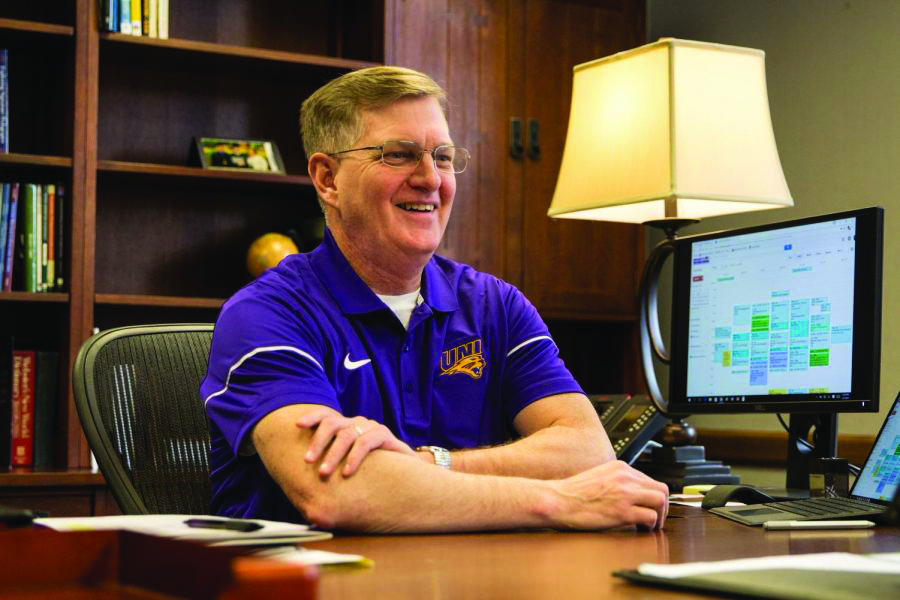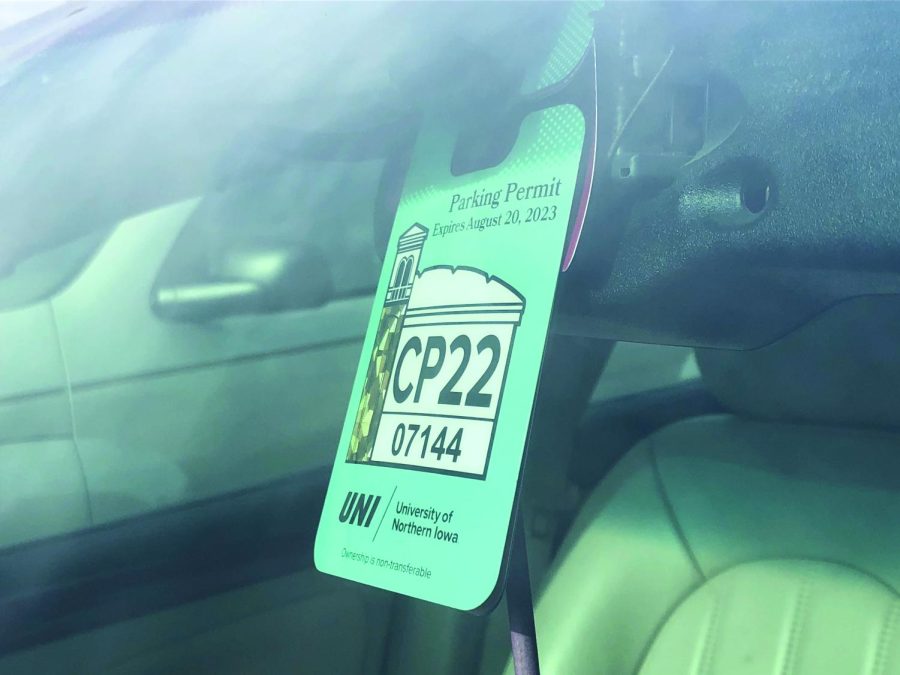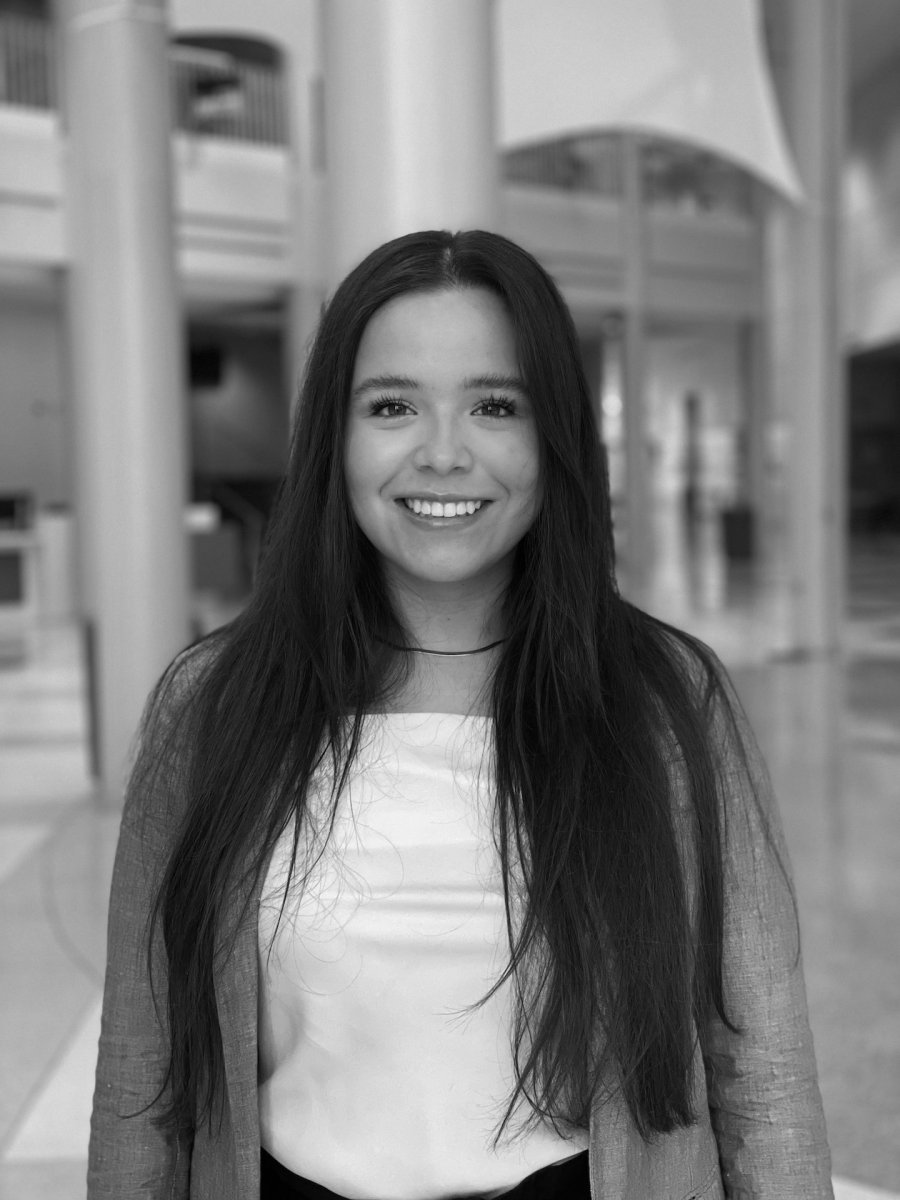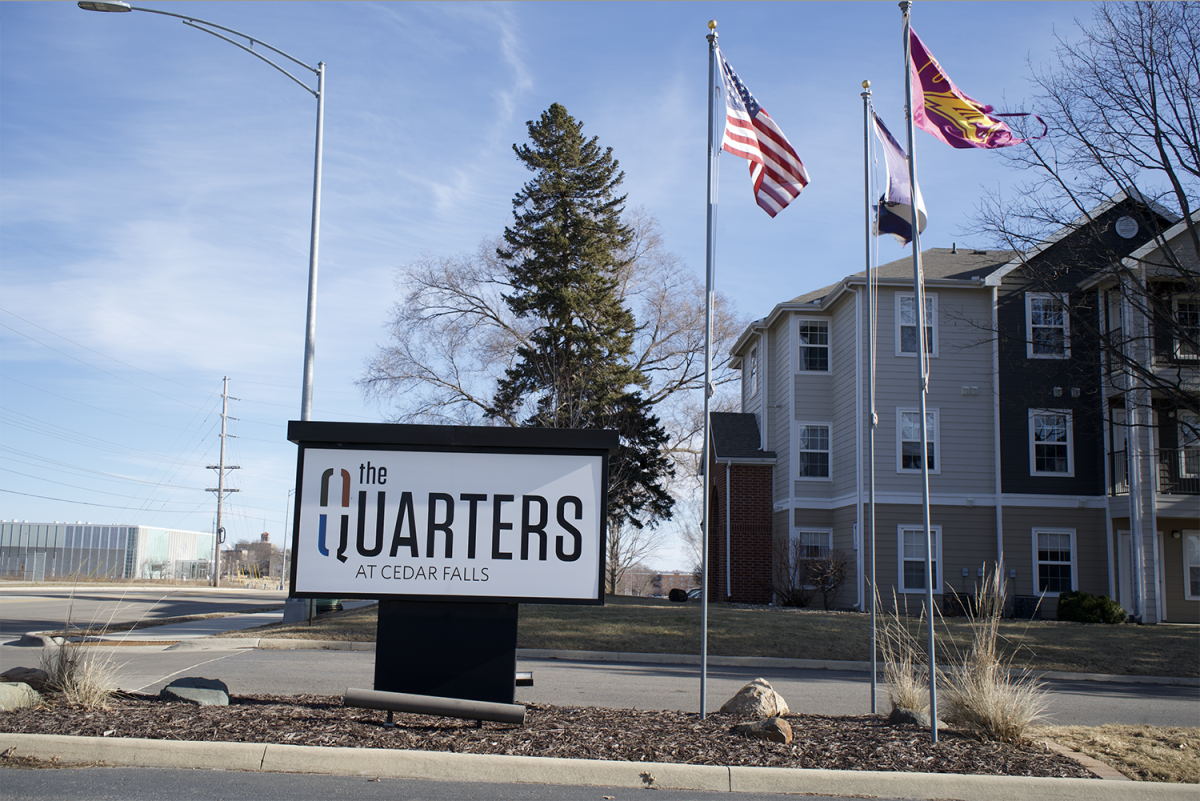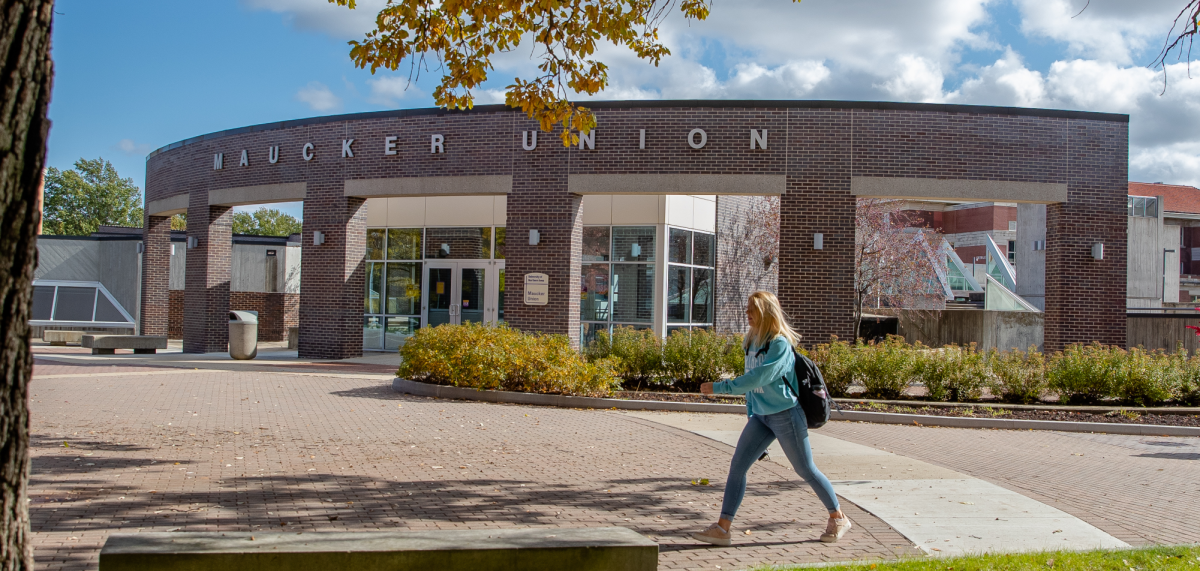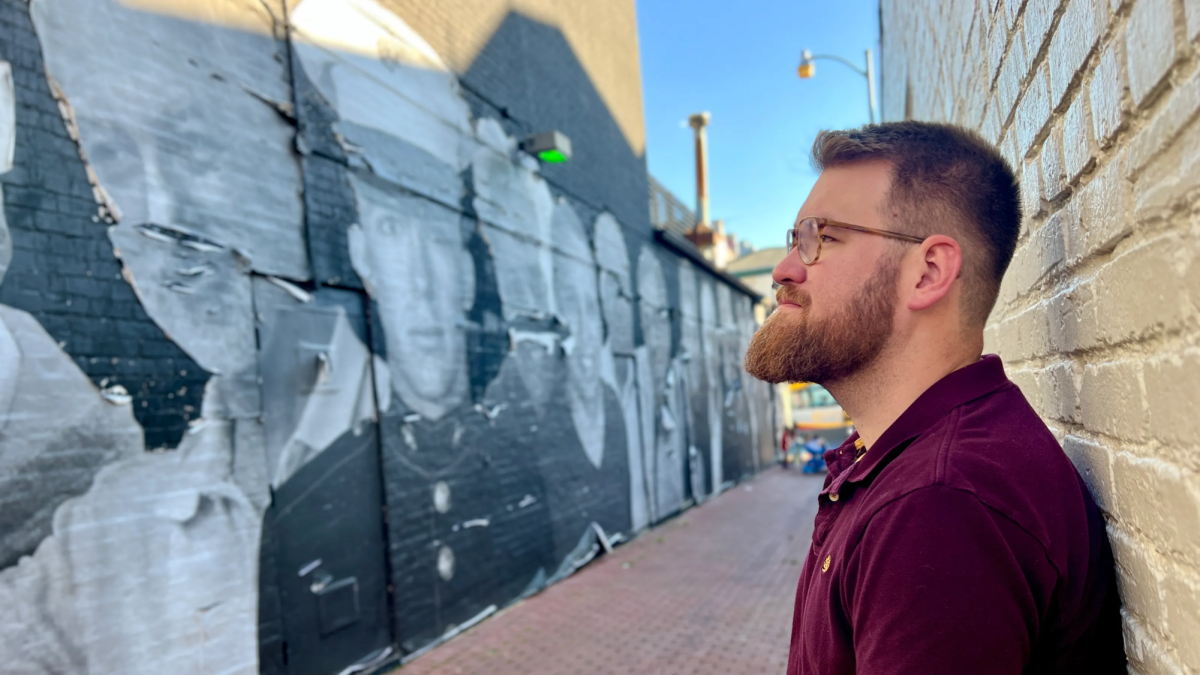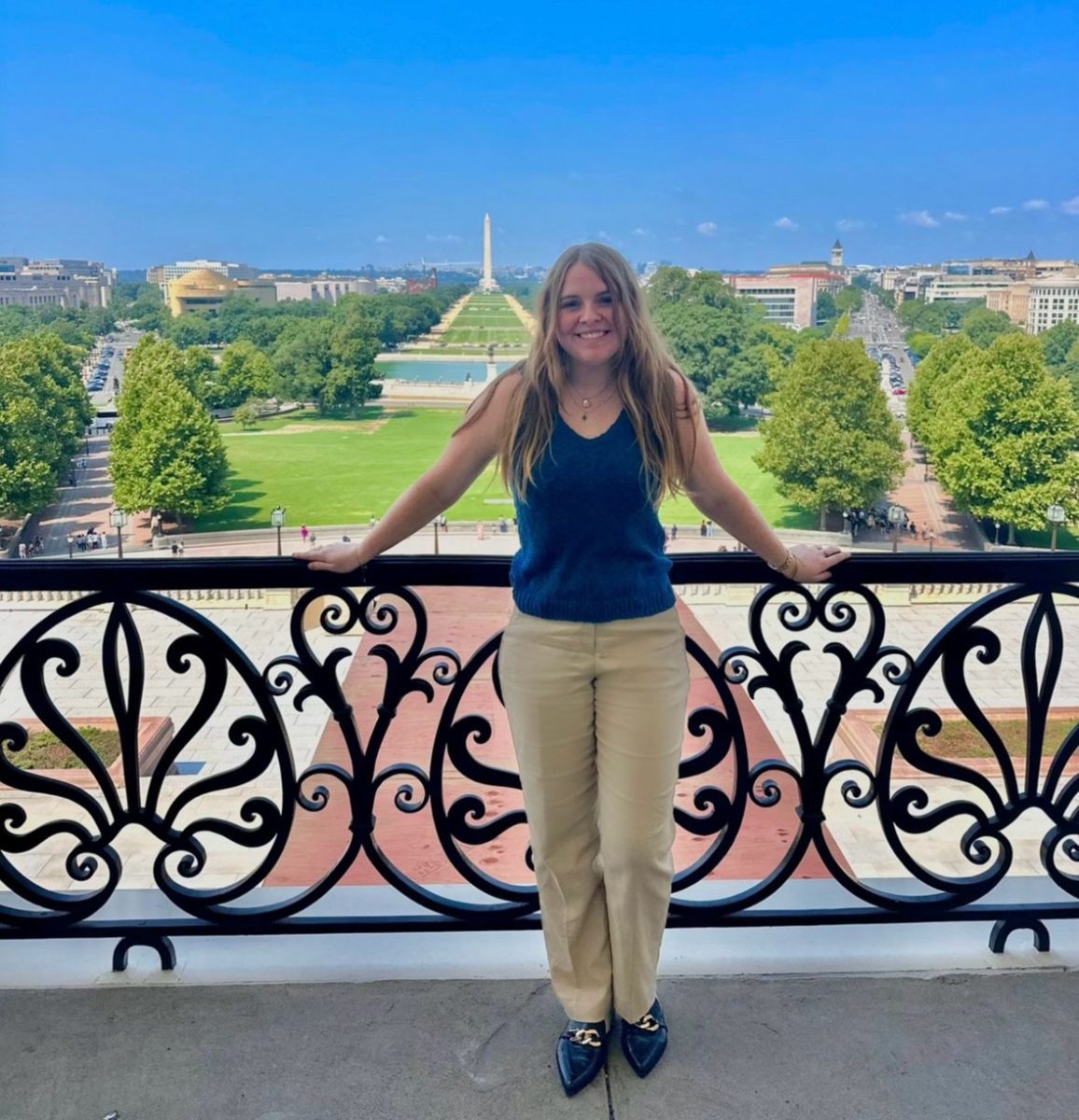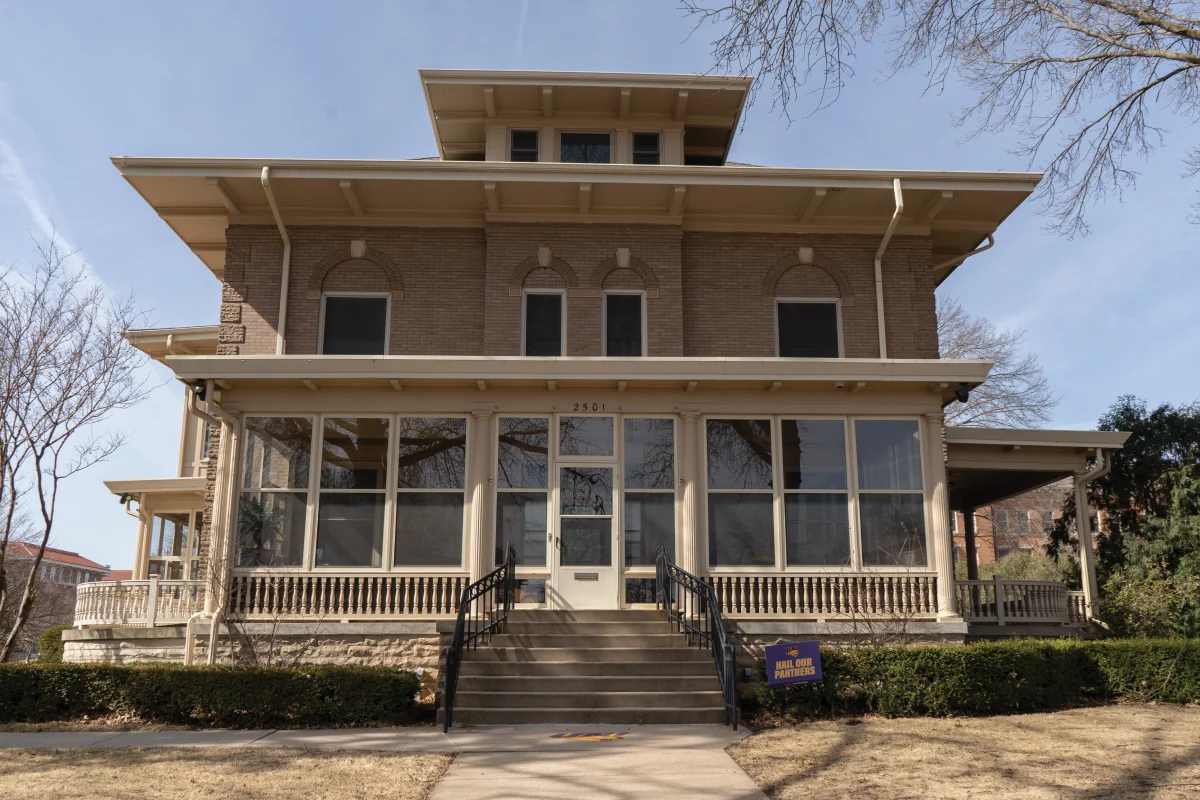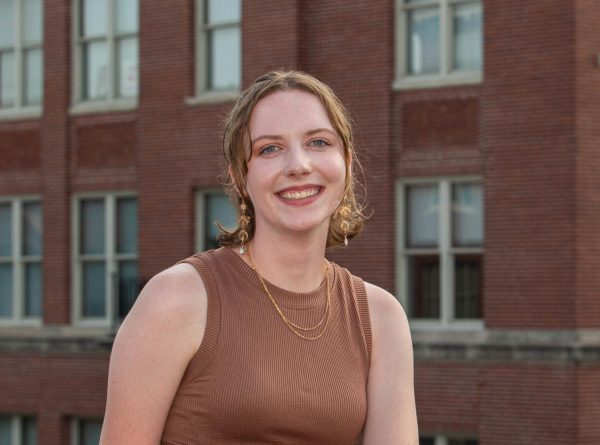The Northern Iowan sat down with President Mark Nook last Friday to discuss the future of UNI, artificial intelligence, DEI and student mental health resources among other topics.
What is the best part about being the president at UNI?
Interacting with students:
“I get to know students and work with students a lot. I went into higher education for that very reason. I went to a school that is smaller than UNI, but it has the same kind of emphasis. I saw there that people really cared about me. There are two faculty members I am still in touch with and, you know, I graduated 43 years ago from college. I’ve always believed that education needs to be personal, and here at UNI it is very clear that students get to know faculty members and they get to know staff members. Many of them even get to know the president. On many campuses you may know what the president looks like and you may get to hear them give a welcome speech, but I just walked across campus to the medical center and there were just a number of students that stopped to say hi and chat because that’s UNI, and that’s this campus.”
Looking to the future:
“What I appreciate is the opportunity to get to think about the future of this institution – 30, 40, 50 years from now. What I’ve really tried to help the university understand is the decisions we make today impact the students who will be here not just this year, or next year, even 40 or 50 years down the line. Some of those decisions students will really benefit from, and some of those they might not so we need to get it right. I’ve been on different campuses, and on every campus I’ve been on there was something on that campus that was a result of a decision that was made 40-50 years earlier. Some of those things were good things, and some of those things we were trying to figure out how to undo because it was having some unintended consequences. So we are trying to have some real thoughtfulness to planning, to thinking long term and not just making decisions quickly. “
Long term plan as President:
“One of the several cool things about being president here is the student body is just incredibly engaged. The faculty and staff really are committed to the success of our students. This time period is really unique in certain ways. In 2017 we had been UNI for 50 years. We became “UNI” in 1967 when we changed our name. In 2026 we will celebrate the institution’s 150th anniversary. So, we have this little 9 year window where we go from 50 years as UNI to 150 years as an institution. In what we recognized in 2017, we hadn’t really sat down and thought about what this university might be like 40-50 years from now. So we decided to take this period of time from 2017-2026 to ask those big questions and lay the foundation for the next 50 years. Ask the institution to think about what we need as an institution to serve the needs of Iowa and the students that come here not in 2026, but in 2052. That’s hard, but it’s fun because there are no boundaries to that. We can think big, think bold. It’s fun to work with students, faculty and staff who are engaged in that kind of work.”
For you, what makes UNI special?
“UNI has this feeling of home, and a feeling of family. Some people talk about it as a small town feel, but it’s more than that. You really do get to know everybody here and make lifelong friendships not just with other students but with faculty and staff. You’ve got access to everything you’d have at Iowa or Iowa State, but now you’ve got access to faculty and to resources that are just really difficult to have at a major university. There’s been several people who’ve been through our campus and said they are blown away because it looks and feels like a small private college, but you walk around a little bit and you realize we have all the resources of a major university. Every alumni I’ve ever met with when I ask who made a difference in their lives while they were here can all name one, two or three employees as well as groups of students. It’s an amazing place and it’s different from any place I’ve been.”
Tell me about a moment that defined your summer?
“There was a group of us that traveled to Kosovo, and we have a couple universities that we work with there. We flew into Kosovo, the first thing we did was we went out to a site where the people of Kosovo staged their first revolt against Serbia. There was this old bombed out house where this general and his family made a stand against Serbian security forces. They left the building the way it looked after nearly all of these people were killed. It was a harrowing story. It was just tremendously moving and emotional to see that space, and then to go around the country and meet with university leaders and hear the stories from college students who were 10-12 years old when the war broke out. They remember having security forces come and take them out of their homes with guns in their back and their face. It was tremendously moving and you kind of had to process all of that. It was just this real, kind of emotional trip. But it was also outstanding to see the connection between Kosovo and the US. I am so proud of what we are able to do with some of the universities there and set up some exchange agreements. It was probably one of my most memorable experiences this summer.”
What are you looking forward to regarding UNI’s long term plan?
Nursing program:
“What we’ve done with nursing and healthcare. With nursing, and the need for nursing in our state, our opportunity to be able to deliver that gave us the opportunity to step back and ask, ‘what if we collected our healthcare stuff into a single entity?’ The faculty and staff that were engaged in healthcare education would be connected to that. We wouldn’t necessarily need to move them, but we need them working together. I think we are going to see some real growth and synergy around that.”
Engineering Program:
“Material science and engineering is our very first engineering program on campus ever. We’ve had some engineering technology programs, but our full engineering will be the first. It’s really happening because of collaboration between the applied engineering technology program and chemistry and physics and the expertise of faculty in all of those programs around the engineering materials. It couldn’t happen without all three of them. So this entrepreneurial spirit has been really good to see.”
As we are entering the post-COVID era, how do you plan on addressing the financial and mental health struggles students continue to face?
“Mental health issues were very strong before COVID hit, and I think COVID exacerbated them and brought them to the surface and made them easier to see in some cases. One of the things we’ve thought about and recognized is what is it that students need? What can we provide? What should we provide? Because we can’t simply become a mental health care facility. While we have a healthcare center, no one expects us to do surgeries, nobody expects us to do anything except for the daily physical healthcare. It’s a place to go and get a vaccine, it’s a place to go if you have a cold so you can go get checked out to find what’s wrong. Major medical goes somewhere else, and mental health is probably the same way. We have to think about what those services are that we can reasonably provide students.”
Telus App:
“One of the things we’ve brought in this year is called ‘Telus’ which is an online 24/7 service available to students. I think that is going to be a big help and will take some of the pressure off our mental health clinic here and give them the opportunity to do things that require sitting down face to face. Hopefully that will make it much easier for people to get the appointments that they need.”
Student Involvement and mental health:
“We’re seeing more and more of our students get engaged in student organizations and things away from the classroom whether those are specific to the major they are in or other things like our sports clubs, BSU or Dance Marathon. Those probably do more for students’ mental health than anything else we can do because they help students connect. Oddly enough, the heat may have helped us that first week because people weren’t looking to stay in their dorm rooms, they were looking to get out of their dorms and apartments, unless they were air conditioned. The number of people in the Union and the Library was really high for the first week of class. But that also meant they engaged with each other in a big way too, so I can’t really say it was the heat, but I don’t think the heat hurt us. I think it really pushed people out of their little cubbies and whatever they see as their space into these public cooled spaces and I think it’s connecting our students and adding to some of this excitement in getting back at it.”
With the rise of artificial intelligence, specifically ChatGPT, how have you seen UNI professors navigate artificial intelligence? How do you foresee the balance of using AI for learning purposes versus the possibility of students using it to cheat?
“I’ve taken the approach, and many of our faculty have taken the approach that ChatGPT and other AI services are tools, they are nothing more than that. What we have to do now is figure out how to use them in a way that is actually helpful to student learning. There are good ways and appropriate ways to use this tool, and there are bad ways and there are inappropriate ways to use this tool.”
“I was the last class in my high school that had to learn how to use a slide ruler which allows you to multiplication, division, and other mathematical operations on this thing that looks like a ruler. We were the first ones then that were able to use a hand held electronic math calculator. They were new. At that time there were a bunch of math teachers and science teachers that were saying, “you can’t use those because you won’t learn how to multiply and divide and actually understand how to do it.” Well, everybody got over that. We recognized we could still teach people how to do math. When you look back at that time, there was this new tool. We had to figure out what was ethical and what was not ethical in an educational scenario. I think AI is going to be exactly the same way.”
The campus climate survey found that 299 faculty members “seriously considered leaving UNI.” What is your plan to help retain and recruit staff at UNI?
“One of the things we are looking at and thinking about is how do we make sure people want to come to this institution and once they are here and want to stay – regardless if they are students, faculty, or staff. I have for a long time said it is higher education’s place, and this is a personal philosophy more than anything else, but it’s our place to help people reach their educational, professional, and personal life goals.
“Especially through COVID when a large number of our people thought about looking somewhere else, that was happening across the country in all fields. The goal for me is to develop an institution, and I know this is never going to happen, but to have an institution where everybody wants to come work here, and everybody wants to come in and hire our faculty and staff members, but nobody ever wants to leave. You know that’s not going to work out, but that’s the goal is to have a place where people really want to work, and they see they are supported and valued by the students they serve, the colleagues in the department, in the college across the university and the community that surrounds them and in this state in which we live. Some of those things we have control over, but some of the others we have absolutely no control over. So how do we continue to support people even when there are things happening outside our control that would be pushing people away? It is about making sure you have appropriate levels of compensation, appropriate levels of other support mechanisms around people whether they are faculty or staff, and working to build an extremely positive and synergistic relationship with especially the Cedar Valley community so that they support our faculty, staff and students and they want us here and they want the people who work here to be here. That’s why I’m out in the community a lot and that’s why we are working with the State Legislature to try and make it a great place for people.”
What is UNI doing to recruit and retain more students?
“One of the things we’ve done, especially with students, is to rethink our marketing and branding. I think you can see it in the look of many of our printed materials as well as our online experience. Our webpage completely changed, and now it’s focused on prospective students and not current employees and current students. Once you are here you know where everything is and you can find it. Prospective students don’t really know where to look, so we’d better put their stuff on the front. So we have a whole different marketing technique and outreach to students.
“We are also rethinking what we are doing in the admissions office, rethinking what we are doing with scholarships so making sure the scholarship dollars are invested in ways to get students to say yes and get a bigger percentage of students to say yes. We also recognize that we weren’t getting as many applications to the university as we should, so we’ve done some things to try and increase the number of students who apply. We are redoing our application process so it’s easier for prospective students to actually complete the application and get it into us. There are sort of a whole package of things we are doing, we aren’t going to rely on one thing, we are going to go in and work in various departments.”
“We also know that what you need to do to recruit new entering freshmen is different from what you need to do to recruit transfer students, and that’s vastly different from what you need to do to recruit grad students. We are looking at the different mechanisms in each of those areas. One of the biggest pieces of recruitment is transfers. What we did with UNI at Iowa Community colleges, a lot of that is about getting our name across the state and it seems to be paying off, not just for transfers, but because there has been a lot of news stories about us working with Iowa community colleges, we have a lot more media around UNI in those communities. So the people who grow up in those communities know more about UNI and they are more likely to send in an application. We are seeing more and more purple shirts across the state especially in those areas where we have a relationship with those community colleges. It really is part of trying to grow our enrollment.”
With the successful partnership between UNI@DMACC among other successful online and hybrid programs, how is UNI planning to expand its programs even further to make education more affordable and accessible for students?
“There are a few things that are really important about UNI@DMACC. One is we’ve already expanded it already to other Iowa community colleges. When we first put the idea together, the goal was to remove barriers to education for people. We got help from Governor Reynolds with some of the federal funds that were part of the COVID relief effort. We got about $1.4 million to offer some scholarships so students would want to come into this program. We are running about 100 more students in that program this year than we were thinking we would last year at this time, so it’s been very successful. (Students) are spread across the state, so it’s been very successful. Because of that, there’s been several departments on our campus that have elevated some of their programs to online so they can take advantage of this. I think we are going to continue to see some growth. We have student support specialists not only at DMACC Urban but we have them at Western Iowa community college in Sioux City, Iowa Western Community College in Council Bluffs, and Indian Hills Community College in Ottumwa. We’re hoping to be able to expand that because it does seem to be serving a tremendous need across the state, and that’s really what it’s all about. It’s about meeting the needs of the population in this state and making sure they have the education they need for the jobs that are here. One of the things I think is really cool about this is we’ve been able to grow the availability of a four year education for people in Iowa without spending one dime on buildings or infrastructure. We’ve used the infrastructure that’s there and simply put our people in place. That people ought to be very excited about from a fiscal standpoint. We need to grow some of these online programs and some of these online programs. And we are seeing students at those campuses directly transfer here because they’ve seen what we are trying to do and they are familiar with UNI.”
The Our Tomorrow campaign has seen an outpouring of support from the Panther Community. What are you most looking forward to seeing come to fruition from this campaign?
“You know, this is a multifaceted campaign. It has four pillars to it. One of them is around student success, and that’s primarily scholarships. Then there’s student engagement and support for faculty and academic programs. And the third thing is iconic spaces. I’m always happy to see our support for student scholarships and academics grow because that means fewer and fewer of our students will be leaving with significant debt. The third pillar, supporting academic programs and faculty, is really important from my perspective because it’s a way we can grow signature programs, take all of our programs and make them even better, and put resources in faculty’s hands so they can better support students. The engagement piece is also very important to me because it’s through that we are going to raise funds for things like supportive internships, undergraduate research, opportunities for students to engage in their professions while they are still students which is a vital part of a college education.
“We also have our iconic spaces. We’ve already seen how important that bell ceremony a year ago was and getting the bells back and the excitement around last year’s Homecoming activities, partly because we were casting these new bells and we were focused on the campanile. So many people are tied to the campanile emotionally. Of course, the Gallagher Bluedorn, which is such a valuable asset to the entire Cedar Valley, and then the UNI Dome. There isn’t one of those I can really pick out and say this is the one, so all of them really are important. People have different interests and what they see as important about the university is a little bit different for everybody. We’ve found some things here that everybody wants to lift up and make work, and they can see the vision for that and see their investment in one of our programs helps the university move forward and reach that vision we have for 2050, 2060, 2070.”
With DEI programs being scrutinized at the state and federal levels, what is UNI doing to ensure programs that help diverse students continue?
“First of all, we have to wait until the Board of Regents DEI study committee reports out at the Board of Regents meeting in November. So, there is not a lot that we can do right now. We cannot add programs as we’ve been told we have to hold everything because the state legislature put the breaks on that. What we have done is made a commitment that we are going to continue to serve the needs of every single student. We recognize that exactly how we do that and the programs we use may have to change. That’s fine, but this is an institution that’s always made a commitment to making sure that every student has an opportunity to be successful. We are not going to change that regardless of that students’ background or their race, ethnicity, gender orientation, it doesn’t matter, we are going to make sure they have support mechanisms so that they are comfortable getting an education here. We will continue to have every student, staff, and faculty member reach their educational, professional and personal life goals.”
“I think we are going to have to rethink how we package that and how we talk about it. How do we make sure that we haven’t let some people slip through the cracks? We will as a university be rethinking that as we want to hear the new structures and rules we have to play with. It’s going to be one of the big conversations on campus, and it’s going to be one we are truly going to have to wrestle with because we are going to have to rethink the model in which we have built things. Given what we now have as the cultural dynamics and rules within our state, how do we assure that happens regardless of what the student is? Okay, challenge accepted. I’m up for it, and I think everyone here is too. That commitment to the individual student and making sure everybody has an equal opportunity to be successful, that’s not going to change.”
Does the university have any plans to take a proactive approach in partnering with the city to revitalize college hill?
Note: President Nook currently sits on the Cedar Falls Economic Development Corporation as one of their board members.
“There was a College Hill plan developed a couple of years ago that hasn’t yet gotten City Council approval to move forward, so we need to get that done so we can move forward with revitalizing the Hill. I think one of the things that a lot of people recognize is that the revitalization of Cedar Falls’ downtown a decade or so ago really changed the dynamics of downtown, and many of our students just love the downtown. I think there are some things that can happen for the Hill that would make it a place where students would want to stay, but it is going to take a reimagining and revitalization of that area.”
“If we had an area that the people of the Valley would love to just come hang out before a show or before a game and it was reasonably close, that would be great. The Hill is in the right location to do that, it just has to become a place where people know how to park their cars and know how to access the businesses there, and then have the certain kinds of businesses and support structures that are needed to have the community to come in. Right now, downtown Cedar Falls fills that, but I wish it was a little bit closer to campus. We are working to ensure we get great access to the university and downtown because it is such a nice place, but it isn’t so college students can get down there, it is so the people downtown can get to our campus. There are more and more people living downtown in the apartments and condos down there, so we want to make sure they can easily get up to our campus and get to the Hill, get to GBPAC, get to the Dome and it isn’t a problem for them to do that whether they want to bike, or walk, get in their car or take the bus.”
Are you ready to get your country on for Homecoming this year?
“I’m always ready to get my country on. I grew up in Holstein, Iowa so I grew up country. Almost everywhere I’ve lived has been more rural than anything else. I mean, I came from Montana where you put on your cowboy boots and grab your stetson. So it will be fun to see what’s going to happen with that and how things come together. There’s going to be some big things happening during Homecoming, so it will be another big year.”
Where is your favorite place on campus and why?
“I’m going to give you a couple. One of them is not really accessible to other people, so that’s probably not fair. In the president’s house, there is an upstairs porch on the south side. Cheryl and I love to sit out there; it is so peaceful. You are really up in the trees because it’s 20 feet off the ground. We have bats that fly around at night and we watched some baby bluebirds fledge out of a tree that’s just outside our window so we both love nature and being outside. The fact that we get to live there really just still blows my mind. But, I also love some of the wooded areas walking past the CEEE and Business and Community Services across the bridge out towards Roth. The plaza around the Campanile we also love. Whenever our grandkids come, they call the Campanile ‘grandpa’s big clock.’ They always ask to see it and they love to walk over there to see it. Especially when it strikes the hour, there is something about being there when the bells are ringing is very special. We just like walking the whole campus. It’s like living in the middle of a park.”
What are you looking forward to most this year?
“It’s the same thing I look forward to every year, and that is getting to know students and working with students, faculty and staff. I look forward to working in order to continue to see this university take steps forward to reach what we want it to be in 50 years, and get that foundation laid for 2026 as we celebrate our 150th anniversary. One of the things that is hard to think about is in Fall of 2025, so 2 years, those freshmen are the 150th class of this institution. That next year, 2026, we as a university turn 150 years old. We’ve got 2 big years coming up, so let’s party for 2 years. I’m looking forward to some of that planning.”
“Honestly, and I know this will sound a little strange, but I am looking forward to the conversation about DEI. It’s going to be hard, it’s going to be stressful, but I know the way this community pulls together and I know we can look at this and say we know what we need to do, we know how to do it now that’s figure out how we can get everyone the education they need, want, and deserve as well as figuring out a new culture and structure. So I am looking forward to that conversation and that struggle we will be in to figure out an answer. I guess this comes from my background in the sciences, but one of the things I love the most is when a faculty member handed me a problem and said ‘go solve this.’ To me it was an opportunity to sit down and figure out something that I don’t know how to do. That’s exactly what we have to do this year surrounding DEI. It’s what we have to continue to do around enrollment. So I love when someone hands us a problem and says go, I need your solution so we’re going to pull people together and find that solution. So, I’m looking forward to that.”


